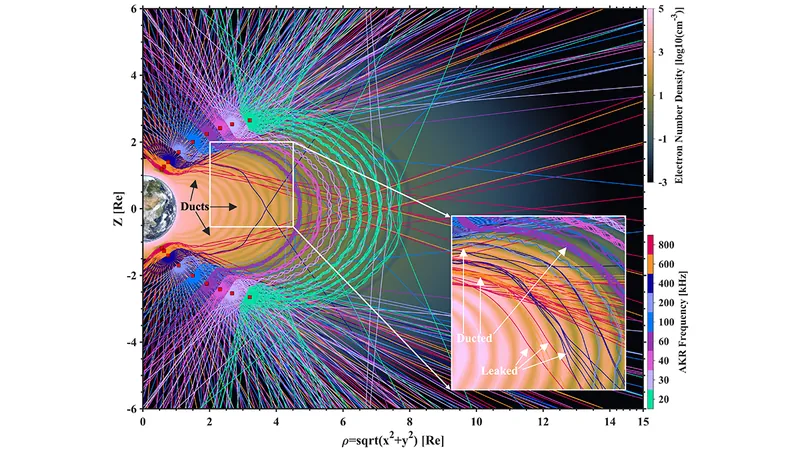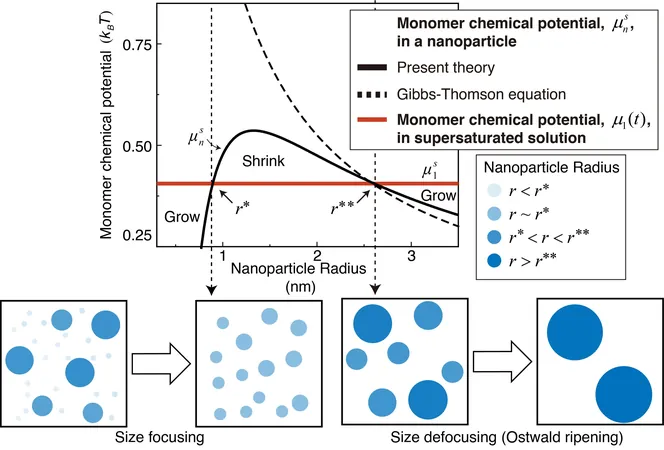
Groundbreaking Cancer Research Revelations from MD Anderson: September 2025
2025-09-05
Author: Ming
Revolutionizing Cancer Treatment: Key Insights from MD Anderson
HOUSTON, SEPTEMBER 5, 2025 — The latest groundbreaking research from the University of Texas MD Anderson Cancer Center offers a glimpse into the future of cancer care, showcasing innovative breakthroughs in treatment and prevention made possible through collaboration between top-tier scientists and clinicians.
Targeted Radiation Therapy: A Game Changer for Kidney Cancer Patients
For patients battling clear cell renal cell carcinoma (ccRCC), a common and aggressive form of kidney cancer, a Phase II clinical trial led by Dr. Chad Tang and Dr. Pavlos Msaouel reveals promising new strategies. The trial demonstrated that metastasis-directed targeted radiation can help delay or even eliminate the need for systemic therapies, with an impressive 94% of participants alive after two years. Remarkably, patients with undetectable disease via a new ctDNA test stayed off systemic treatments twice as long, ushering in a new era of precision medicine.
Immunotherapy Vaccine Offers Hope Against Pancreatic and Colorectal Cancers
In a significant breakthrough, the ELI-002 cancer immunotherapy vaccine is showing remarkable promise in prolonging survival for patients with KRAS-mutated pancreatic and colorectal cancers. Co-led by Dr. Shubham Pant, the AMPLIFY-201 trial's long-term data indicates a 68% strong T cell response, with median recurrence-free survival not yet reached among high responders after two years. A Phase II trial is ongoing with a new vaccine formulation, amplifying optimism in these challenging cancers.
Triple Therapy Tackles Treatment-Resistant Colorectal Cancer
For those with the aggressive BRAF V600E mutation in metastatic colorectal cancer, conventional treatments often fall short. MD Anderson’s new Phase I/II trial unveils the potential of a triple combination therapy of encorafenib, cetuximab, and nivolumab, achieving a striking 50% response rate and over seven months of progression-free survival. The results indicate a significant step forward in addressing resistant cancer types, with a national Phase II trial set to follow.
Innovative Technology Solves Breast Cancer Mysteries
Using cutting-edge single-cell DNA and RNA sequencing technology, researchers led by Dr. Nicholas Navin have unlocked mysteries of breast cancer progression. By identifying ancestral breast cancer cells and their genetic changes, this breakthrough methodology could reshape our understanding of breast cancer biology and potentially lead to more effective treatments.
CRISPR Technology Reveals Secrets of Stomach Cancer
In an exciting development, Dr. Yuan-Hung Lo and his team utilized CRISPR screening in stomach organoids, uncovering crucial gene-drug interactions linked to cisplatin sensitivity. This discovery opens up new avenues for tailored treatments in stomach cancer, enhancing our grasp of how genetic factors influence chemotherapy responses.
First Pan-KRAS Inhibitor Emerges with Promising Results
The search for effective treatments targeting the notoriously difficult KRAS mutations has led to the development of the first-in-class pan-KRAS inhibitor, BI-2493. This novel therapy has shown strong antitumor activity across multiple cancer types, reshaping the treatment landscape and suggesting potential combinations with existing therapies to maximize efficacy.
High-Dose Chemotherapy Shows Promise for Aggressive Germ-Cell Tumors
A Phase II trial exploring high-dose chemotherapy for multiply relapsed germ-cell tumors yielded exceptional results, with a 55.5% overall survival rate after five years. This trial emphasizes the importance of innovative approaches in revitalizing therapies for patients facing daunting prognoses.
Fluorescent Tracer Enhances Surgical Precision in Pancreatic Cancer
Introducing V-1520, a novel fluorescent imaging agent, holds immense potential for enhancing surgical outcomes in pancreatic cancer. By binding to specific overexpressed proteins, V-1520 illuminates precancerous lesions during surgery, significantly improving detection and removal of at-risk areas.
Linking Oral Cancer to Metastatic Biomarkers
In a pioneering study, researchers led by Dr. Koichi Takahashi discovered critical biomarkers indicative of metastasis in oral cancer, identifying a unique 23-gene signature that could revolutionize prognostic assessments and treatment strategies.
Recognition and Accolades for MD Anderson
MD Anderson has been honored as a 2025 Joy in Medicine organization by the American Medical Association, reflecting its commitment to advancing healthcare and cancer treatment.
These remarkable discoveries highlight not just the resilience of cancer research, but also the relentless pursuit of innovative solutions that bring hope to millions of patients worldwide.



 Brasil (PT)
Brasil (PT)
 Canada (EN)
Canada (EN)
 Chile (ES)
Chile (ES)
 Česko (CS)
Česko (CS)
 대한민국 (KO)
대한민국 (KO)
 España (ES)
España (ES)
 France (FR)
France (FR)
 Hong Kong (EN)
Hong Kong (EN)
 Italia (IT)
Italia (IT)
 日本 (JA)
日本 (JA)
 Magyarország (HU)
Magyarország (HU)
 Norge (NO)
Norge (NO)
 Polska (PL)
Polska (PL)
 Schweiz (DE)
Schweiz (DE)
 Singapore (EN)
Singapore (EN)
 Sverige (SV)
Sverige (SV)
 Suomi (FI)
Suomi (FI)
 Türkiye (TR)
Türkiye (TR)
 الإمارات العربية المتحدة (AR)
الإمارات العربية المتحدة (AR)